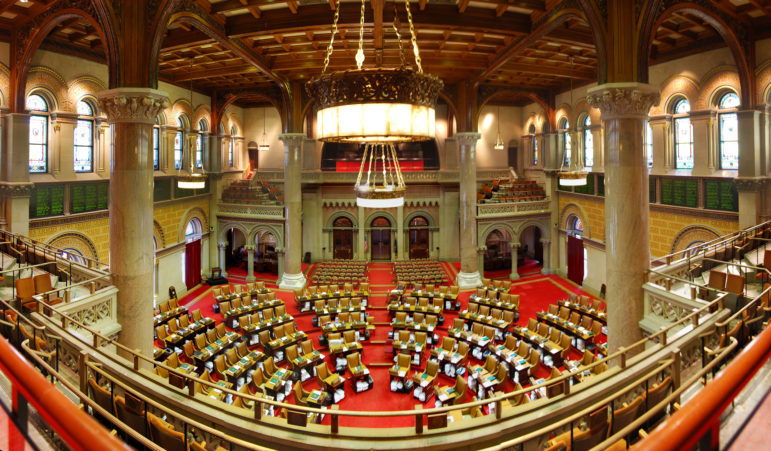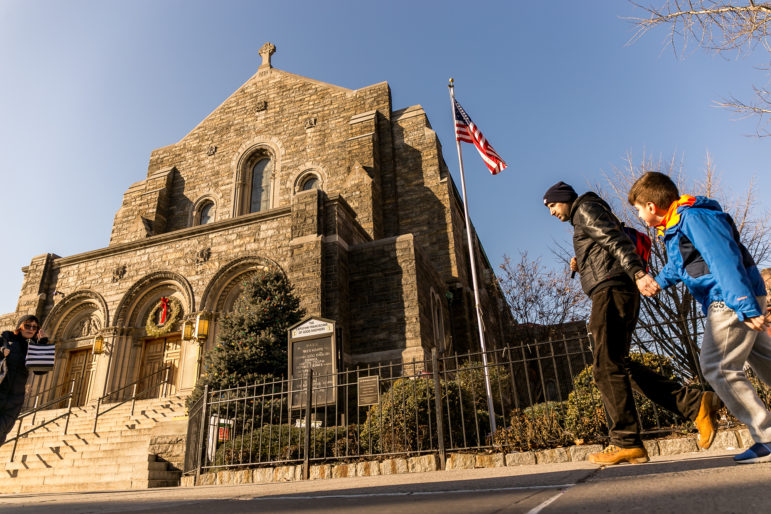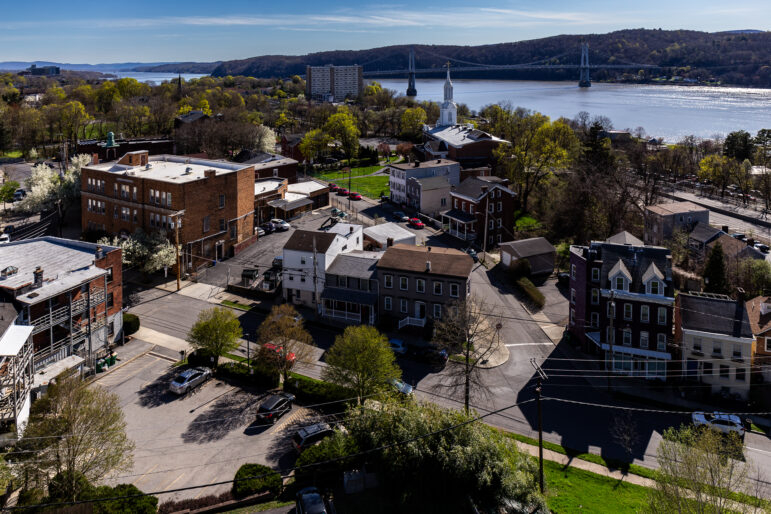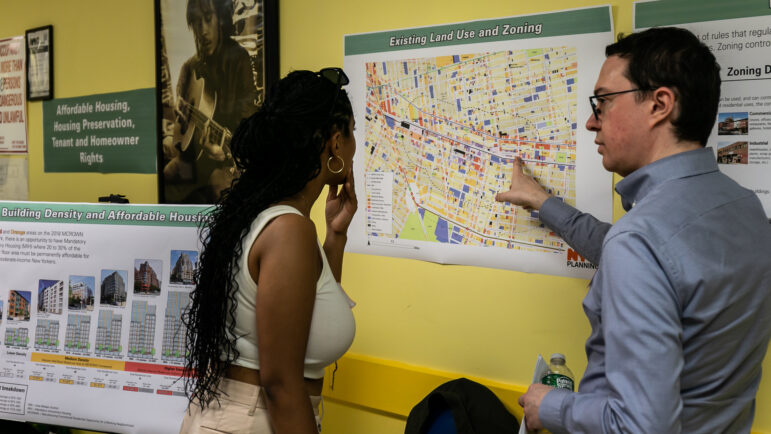
Matt H Wade
The Assembly chamber. Traditionally controlled by Democrats, the lower house has often passed pro-tenant legislation that died in the Senate. Now that Democrats run both houses, tenant groups are putting pressure n to achieve deep changes.
A Manhattan hearing room for the State Assembly Committee on Housing was crowded with real estate groups, city officials housing advocates Thursday for contentious testimonies about major capital improvements, individual apartment improvements and “good cause” eviction legislation among other rent regulation issues due for a vote in Albany this June.
“Affordability is perhaps the biggest issue we are facing as a city right now, and the steps we take to combat this problem will define the type of city we have in the years to come. We must get this right,” said City Council Speaker Corey Johnson, who testified in support of rent regulations reforms.
Two of the nine bills advocates are seeking target landlords’ ability to raise rents to recover the cost of supposed building-wide renovations, called through major capital improvements (MCI), while another bill would similarly reform individual apartment improvements (IAI) . Both bills would not allow landlords to raise rents in order to regain the funds from making renovations.
Make the Road New York and Community Action for Safe Apartments (CASA) also had tenants and organizers testify on their personal experiences and their neighbors’ experiences of being pushed out during renovations, and rising rents afterward. Tenants shared their personal experiences of losing their rent-stabilized units and being harrassed by landlords. Others shared stories of how they witnessed landlords make improvements in their buildings or apartments, then watched their neighbors’ rents rise until they could no longer afford to pay the rent and would leave.
New York City Department of Housing Preservation and Development Assistant Commissioners Lucy Joffe and Elyzabeth Gaumer both said in their testimonies that city housing policies have preserved and created affordable housing and expanded tenant protections with programs such as Certificate of No Harassment and the creation a Speculation Watch List for bad-acting landlords. However, rent stabilization laws remain the largest source of affordable housing, they said,
“Our most comprehensive protection is rent stabilization. Rent stabilized apartments are both the largest source of lower-cost housing in the city and provide critical tenant protections that enable residents to remain in their homes and exercise the choice to stay in their neighborhoods. To preserve this invaluable resource, rent stabilization laws must be renewed and strengthened,” said Joffe.
Another bill calls for new regulations for buildings with six or fewer units, known as “good cause” eviction legislation. “Good cause” is a legal term that does not allow an action without substantial grounds or reason to take place. For example, if a landlord raises the rent a significant amount and the tenant cannot pay the new rent, the landlord would have to prove the increase was a necessity.
Under current rent stabilization regulations, which apply to larger buildings, a landlord can only evict a tenant with appropriate notice through court proceedings if the tenant “fails to pay rent, causes a nuisance, damages the apartment or building, or commits other wrongful acts, the owner may begin eviction proceedings in court after serving proper notices” according to the state agency Homes and Community Renewal, which regulates rent-stabilized units. The coalition of housing and tenants groups Housing Justice for All stated in their platform that tenants in housing stock from smaller buildings in neighborhoods facing gentrification such as Bushwick or East New York are under the threat of displacement when they do not have protection laws in place.
Sateesh Nori, an attorney with the Legal Aid Society Queens office, said he has seen firsthand how the number of affordable housing units have declined in gentrified neighborhoods such as Long Island City and Astoria while the number of tenants cases have increased in his office. “This bill would represent a huge step forward for Legal Aid’s clients in all five boroughs, with an especially large impact in Queens. If this bill were passed, tenants in 163,000 additional units across the borough would be afforded basic protections. For Legal Aid lawyers on the front lines of the city’s housing crisis, these protections will help even the playing field in court, reducing the number of eviction proceedings brought against low-income tenants, and empowering them with many of the legal defenses tenants in regulated apartments already enjoy,” said Nori in his testimony.
Although dozens of tenants gave testimonies supporting stronger rent regulations, real estate groups such as Real Estate Board of New York (REBNY) and the Rent Stabilization Association (RSA) said the rent regulation reforms being introduced could have a negative economic impact on the real estate market.
Paimaan Lodhi, REBNY’s senior vice president, said property owners have to pay rising property taxes while funding crucial repairs or improvements for their properties. And Joseph Strasburg, the president of the Rent Stabilization Association, opposed the good cause eviction law, saying the bill continues to pit tenants against landlords.
Other bills in the package under consideration include one to end vacancy decontrol, by which a rent-stabilized unit leaves the program if its rent exceeds $$2,774.76 or the tenant-household’s income exceeds $200,000, as well as one making preferential rents permanent. Preferential rents occur when an owner charges less than the legal rent–creating the threat of a sudden, massive increase in rent far larger than the year-to-year increases approved by the city’s Rent Guidelines Board. Another bill would eliminate the vacancy bonus, which allows landlords to boost rent by 20 percent every time a lease changes hands.
Another piece of legislation would expand rent stabilization laws–which currently only apply to municipalities in Nassau, Westchester, and Rockland counties and New York City. Other bills would give six years for a tenant to make a complaint against their landlord (currently the law allows four years) and creating a new statewide rent supplement for low-income families and individuals who are facing eviction, homelessness, or loss of housing due to domestic violence or hazardous conditions.
So far, the State Assembly Committee on Housing has scheduled two additional hearings on rental housing and tenant protections. The next one will be held in Albany on May 9, 2019 9:30 a.m. at the Hamilton Hearing Room B Legislative Office Building and the third hearing will be held in Rochester on Friday, May 10, 2019 11 a.m. at the Legislative Chambers Monroe County Office Building 39 West Main Street.









One thought on “Lawmakers Begin Formal Consideration of Moves to Bolster Rent Regs”
‘Another bill calls for new regulations for buildings with six or fewer units…’
1, 2 and 3-family homes should be exempt from regulation. They are not the same as apartment buildings which are basically businesses.